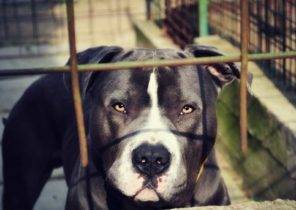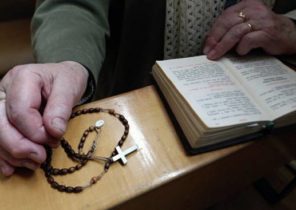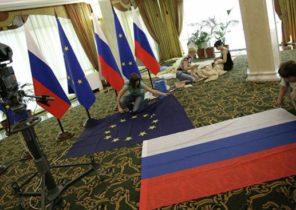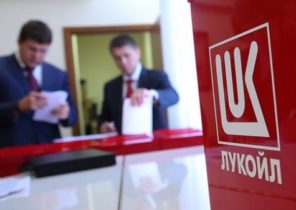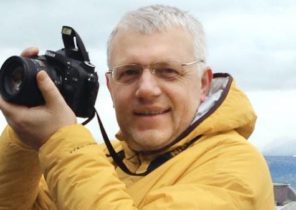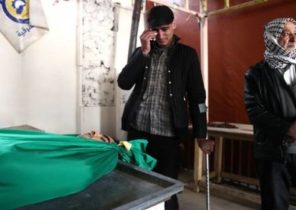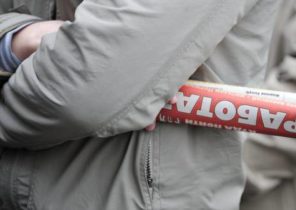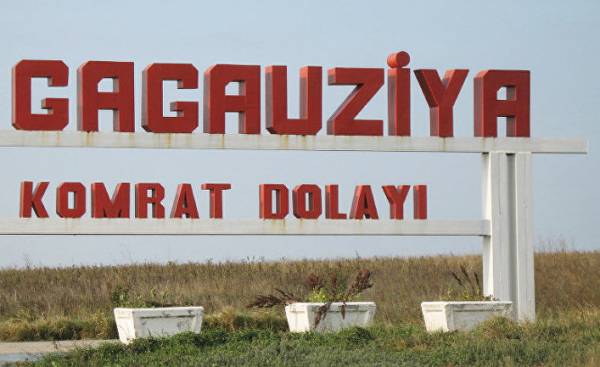
The TV channel “Gromadske” in the framework of a series of articles on national languages in the countries of the former USSR has prepared a report on Moldova and Romanian language also known as Moldavian. During his stay in Kishinev journalist Ksenia Turkova talked with a number of local experts and specialists in this field.
I’m sitting in one of the Chisinau restaurants and looking at menus trying to guess the values of unknown words, they are looking for familiar roots. Oh, “vegetables” in French is legume! Orange — portocaliu — refers to the Greek. Brunch prânz, of course, almost a twin of the Italian pranzo. Ceai and just just like our own “tea”.
“The Romanian language seems to be similar to all at once, but really like no one, he by itself”, — says the journalist, TV presenter Maria Levchenko, with which we came here. Maria makes a reservation: she calls the language Romanian, but in another company I can hear the second name is Moldovan. It all depends on what political views will stick to my interlocutors.
“If I am in the society of certain people, do not want to cause conflict and I need to maneuver and not to any Romanian or Moldovan, then I just call it a state language, — says Maria Levchenko. — And there is nothing to complain about, this issue cannot be politicized”.
The language of Moldavia really is unique that can not be defined with the name. And it’s not in science but in politics. Linguists recognize that language nearly identical to Romanian (almost, because any territorial option is especially). But what to call it, should decide policy and society. However, while doing this they categorically do not want. Politicians do not stop to argue: some are afraid of the Union with Romania, others — almost a “new Russian Empire”.
Review of the linguist, a specialist in typology, the author of the book “Why languages are so different?” Vladimir Plungian:
“The question is utterly confusing and heated on both sides. Objectively before us some space geographically distinct variants of the same language. More a linguist you won’t say anything. Then begin to act the factors of history, culture, politics, religion.
It is not true that in Moldova speak the same Romanian in Romania. But it is not true that Moldovan and Romanian is objectively different native languages. The question of the name there is generally not a priority, there are cases where different States recognize that speak the same language as Austria and Germany (despite the fact that the characteristics of Austrian German there is no denying). On the one hand, nothing terrible will happen if the name “Moldovan language” will be saved, but it’s too politicized an issue. Any territorial language option hundred percent it is reasonable to call an independent language if the majority of its speakers have such a desire.”
But while in Moldova contradict each other even the main documents: the Constitution the language is called Moldovan, and in the Declaration of independence — Romanian. However, in 2013 the constitutional court declared the priority of the Declaration of independence over the Constitution. That is, formally recognized the Romanian language. But consent is not added.
The stranger, who, relatively speaking, fell into Moldova from the moon, it would be difficult to understand on what is still the language spoken by its inhabitants. One language, and the names of two. And each is highly politicized.
Maria Levchenko admits that she really wanted to call the language Moldavian, but can’t afford it: “We live in the Republic of Moldova, and to build our independent, real, strong sovereign state, we must have your language is Moldovan, which will emphasize our identity, to emphasize that we are not a part of Romania that we are developing as an independent country. But I can’t do that, because if I say that I speak Moldovan language — I was immediately referred to a certain political category, which I can not find and do not feel”.
The language issue in the political field of Moldova occurs, if not daily, then weekly, tells us the Deputy of the Moldavian Parliament from the Liberal democratic party Vadim pistrinciuc. According to him, all 25 years of independence this issue in Moldova played a crucial role. Easy for politicians to play on it, given the problem of identity in Moldovan society, some of whose members consider themselves Romanians and some Moldovans. It’s a split, says Deputy, a native of the Soviet Union:
“In the Republic of Moldova in Soviet times, the government conducted a serious policy of creating a new identity. Because before the war Moldova, or Bessarabia was part of greater Romania. After the Molotov-Ribbentrop Pact, when Europe was divided, Bessarabia became part of the Soviet Union, was then made including scientific approaches to create a new, artificial identity as a Moldovan citizen. And even then the language has undergone changes. From “Romanian”, he became “Moldavian” was even Invented new words with Russian roots, was also the transition to the Cyrillic, and the Romanian language in the Latin roots.”
Vadim Pistrinciuc started learning Romanian grammar after Moldova became independent. He says that in the development and maintenance of the language of great assistance to Romania. But in this effect in Romania, for quite a large part of society is a threat. You may need to changed at least a couple of generations to come to consensus, says Deputy head of the PLDM. However, admits that in his opinion, a sort of consensus have already emerged:
“I even know of political leaders who publicly declare that it is the Moldovan language, but among themselves they say, “Yes, I understand that the language is Romanian”. We even joke sometimes. We recently had parliamentary debates about national identity. And we had two deputies. One says: “I speak Moldovan”. And I said, “And I’m Romanian, but I see we understand each other!””
A colleague of Pistrinciuc in Parliament, Communist MP Inna Supac with the name “Romanian” does not agree. The decision of the constitutional court of 2013, it considers politically motivated and refers to the fact that “at least three of the five judges — Romanian citizenship.” Appeals Deputy and the history, Recalling that the Moldovan statehood goes back more than 600 years (the first recorded mention of the Moldavian Principality refers to 1359), and Romania was formed as a state only in the mid-nineteenth century.
For Inna Shupak, the state language of Moldova is a non-native, she grew up in a Russian family, but learned the language and believes that it is necessary to study and develop. “We need to show that the knowledge of the state language is taken for granted,” says Shupak.
However, one of the deputies from both parties agree: the language issue is highly politicized. According to Inna Supac, politicians in the heat of battle to use the language issue to divide the society into friends and foes. And besides, it distracts people from other, no less important, issues: “I think that this problem can be solved when we solve the main problem — those who runs government. When we, the citizens of Moldova, including those who are in opposition, the confidence in the institutions of power including the Constitutional court. Now we have no confidence”.
Draws the attention of the Deputy and on the status of the Russian language. In Moldova, still has a law on functioning of languages of 1989, according to which Russian has the status of language of interethnic communication. However, the education Code from 2014 actually moved Russian to the status of foreign. Inna Supac convinced that all this “further split the already divided Moldovan society”.
About the division into friends and foes as the main problem the Moldovan society says communications specialist Anastasia Primov. “We are all very black and white,” she says. The Anastasia — from bilingual families. Mother speaks Russian, dad’s Romanian, and they know both Russian and Romanian. Anastasia says that in her family the language issue: they just speak the language, what is understood by the interlocutor. But not all:
“In most families it happens so that people identificeret yourself or with one country (Romania) or (Russia). And here there is a lot of space for interpretation and manipulation. Very often, when the background of linguistic criteria begin to divide society into our own and others, I feel it. That is, if I speak Russian and I go somewhere, I feel the views of people who only speak Romanian and understand that they have recorded them in “other”. Very convenient way to manipulate people: you’re just a chip about the language barrier — and immediately have 100 people and 50 to 50″.
According to Anastasia Primov, the problem of the identity of Moldovans is one of the sharpest, if not sharpest. Even in the history books (Romanian history) the inception of Moldova dedicated to just a few pages. Today Moldova allotted very little space. Basically it is the bare facts, says Anastasia: then, such number took it. Including this, she said, should look for the causes of the division of the Moldovan society:
“We have a few topics for speculation in Moldova, to divide people into “us” and “them.” The first is linguistic, the second historical, the third is Transnistria: our it’s not ours, someone else’s or their own, as where to attach or release, what to do with them? And minorities, minority rights, such as the topic of LGBT, the topic of minorities in Gagauzia, Ukrainians and so on. They are included in a time when society was “uncomfortable” when it is too United”.
By the way, with the languages of the national minorities in Moldova is also not so simple. Gagauz is one of the three official languages of Gagauzia in 2010, UNESCO added to the list of endangered languages. By law, all official signs and announcements in Gagauzia should be duplicated in three languages: Gagauz, Romanian and Russian. However, to meet a trilingual inscription here is almost impossible.
Filmmaker Ivan Pateman says that once spent half a day to get around the capital of Gagauzia — Comrat and found a total of 25 signs in the Gagauz.
Now Ivan takes the world’s first film in the Gagauz language. Shooting began on the money, shot the pilot, launched the project. But then I realized that the personal budget is not enough, and has launched a crowdfunding. Collected in three “waves” of money was enough for the shooting. In addition, someone was helping the crew with food, someone gave free transport.
Actors, well-speaking Gagauz, Ivan scored at a local theater. But there were folk casting. The authors of the film invited all the locals to try themselves as actors, people came very much. Ivan says that language support is important: people understand that their native Gagauz — not a Museum piece but a living language, which gives the opportunity to earn.
In the scenario of the film is a classic Gagauz literature Nicholas Basoglu about love and Shakespeare the rivalry between the two families.
About the role of politicians and officials the development of Gagauz language and culture Ivan does not want to talk immediately warns us not to ask about politics. The same request speaks to us and known in Gagauzia, the singer Vitaly Manjul with whom we are casually acquainted on the threshold of the local house of culture. Vitaliy — real, without pathos, a patriot of his language. Talks about it with love and inspiration. And what do politics, says he doesn’t care:
“What officials are doing, very few do I even care about. Want do you want — do not. One thing: preserving their native language not only depends on the States to a large extent it depends on parents, from how much we want to preserve this language. I don’t think that helped me the state so I know your language.”
Vitali knows the native language since childhood, because he lived in an atmosphere where always spoke the Gagauz. Grandma read stories and sang old folk songs. Vitaly and now can hum some of them. Directly during the interview, he sings us her grandmother’s song about the shepherd’s request that he open my heart and soul watched over his sheep, so he poured them water, so they have something to eat. And then invites in a small Studio working on songs.
The Gagauz language is, unfortunately, not moved from the area of folk songs, fairy tales and conversations with her grandmother in the sphere of public life, says social activist Mihail Sirkeli, the Gagauz in the fifth generation. Michael was born in the Gagauz-Bulgarian village, his family told mainly in the Gagauz: “It basically was a property in Soviet times, families where the parents had higher education and were not, say, a rural elite. Then when I went to kindergarten, parents are very much convinced that they spoke the Russian language to children get rid of the Gagauz accent”. One day, says Michael, the father decided suddenly to speak Russian. But his experiment did not last a few weeks: the mother said that the family should only be heard Gagauz.
But now the situation has changed: in the Gagauz says fewer local residents. Basically, this language is saved in Gagauz villages. If children live with grandparents and parents at work, they speak Gagauz. And if you live with parents — in Russian. In Soviet times, the Gagauz in schools is not taught. The Gagauz people have always fought for their language and culture, says Michael, and notes: after Moldova became independent, the local movement of the Gagauz have become a Pro:
“Here, in Gagauzia the Gagauz were first dissidents who organized the first movement for the Gagauz the Gagauz language and culture. But then, when the collapse of the Soviet Union and there was the nationalist movement for all former Soviet republics, Gagauz — given the fact that the nationalist movement was Pro-Romanian Moldova and in fact advocated the unification of Moldova with Romania, the Gagauz people saw this as a very serious danger to themselves, being mostly Russian-speaking. And then somehow the movement for the Gagauz language, the public, they pragarauskas turned into Pro-Russian, because people wanted to preserve the Russian language”.
The influence of the Russian media in General is quite in Moldova and in Gagauzia. There is a paradoxical situation: the Gagauz fought for the autonomy to develop language and culture, but really do not do it and prefer Russian. The whole document is in Russian and hard to find at least one document in the Gagauz language, and recognized the Expert. However, to start this workflow it would be difficult — in fact, preserved the Gagauz language is poor, he does not develop.
In Gagauzia there are even public television and broadcasts in Gagauz language in the morning and evening. But all this does not help the fact that the Gagauz language was basic. Those who want to stay here, learn Romanian or Russian is used. And those who look to the West, learn English and other languages. The government, said Mihail Sirkeli until “found a trick” to encourage people to learn and develop the Gagauz.
In Gagauzia and Moldova in General, in the first place is the same question of identity: who we are, part of a Russian, Romanian or Moldovan — world?
Communications specialist and PR Primov Anastasia says: if she was commissioned a campaign to promote the state language of Moldova is for those who speak Russian, she would have chosen as the Central image something basic, associated, for example, with kitchen. “I would talk about cooking and came up with some slogan that is associated with food. For example, “the Romanian language — this is delicious!” Because tastier to live when you know both languages. And under this slogan could be movies, how can you enjoy coffee and you will be delicious, if you order it in Romanian”.
Finally left to agree on how to call the main dish in this menu.

